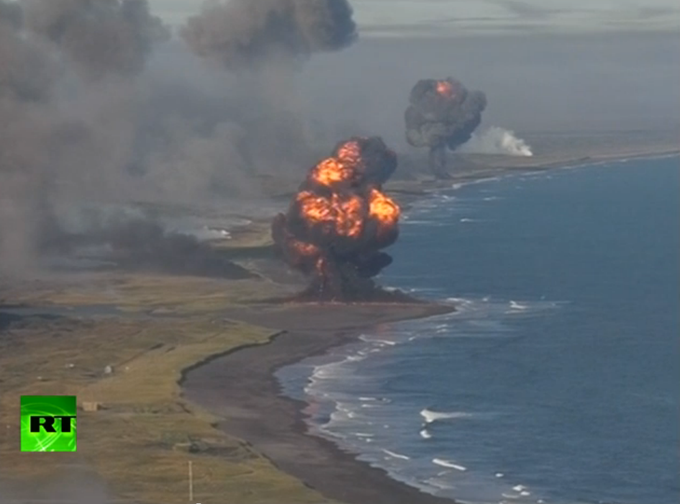
The West Gives Putin Too Much Credit
- By Joerg Forbrig
- Sep. 25 2014 1
Barely a year has passed since Russia threw down
the gauntlet to the West over Ukraine, when Moscow made plain its
objections to the European integration sought by Kiev. With breakneck
speed, the dispute turned into a full-out war imposed (though never
declared) by the Kremlin against its smaller neighbor. Relations with
the West, meanwhile, have returned to a confrontation reminiscent of the
Cold War.
In this conflict, President Vladimir Putin has shown
cunning, boldness and determination, while Western leaders have appeared
disoriented, indecisive and ultimately weak. This, and Moscow's
seemingly unstoppable march from one victory to the next, has fueled
despair among those suffering from Russian aggression in Ukraine
and elsewhere, while drawing admiration among Kremlin supporters
in Russia and beyond. However, and admittedly against all appearances
at this stage of the conflict, Putin has clearly overplayed his cards.
When Putin retook office in 2012, the new-old president
vowed to restore Russia's standing in the world. In his view, a new
multipolar world order was emerging, one that was no longer led by the
West and in which Russia could play a key role.
To do so, Russia was to re-integrate the post-Soviet space
and lead its own regional bloc, to limit Euro-Atlantic integration
on its Western borders and to build new alliances in the East
and elsewhere in the world. Two years into his presidency,
and accelerated by the Ukraine crisis, it is becoming increasingly
obvious that Putin is failing on all of these accounts.
First, the Russian president has proven unable to stem
the centrifugal forces that are driving the former Soviet Union ever
further apart. His grand design for a Eurasian Union isn't attractive
to Russia's former satellites, whose populations have grown fond
of independence and whose local rulers defend their mostly autocratic
rule.
Coercion in turn, as applied to Ukraine, has irrevocably
alienated Russia's most important neighbor. Those still willing to risk
doing business with Russia, meanwhile, can ask for highly favorable
terms. In doggedly pursuing this integrationist agenda, Moscow will see
the Eurasian Union becoming an expensive drain on its resources, rather
than a way to increase its regional and global sway.
Second, Putin has dramatically underestimated the unity
and strength of the West. His plans to drive political, ideological
and economic wedges between Europe and the U.S. have largely been
frustrated. Instead, after long months of hesitation and faced with
ever-greater tragedy in Ukraine, the European Union and NATO have
regained their sense of purpose.
In lockstep, the U.S. and the EU have rolled out wave after
wave of political and economic sanctions. The EU sped up the association
process with Ukraine, as well as with Georgia and Moldova, and it is
pressed ever harder to provide these neighbors with a clear European
perspective. NATO has effectively returned to its original mission
and has started to reinforce the defense of its Eastern-most members.
In short, rather than preventing Western influence, Putin's approach has
brought Euro-Atlantic structures closer to Russian borders than ever.
Third, Putin has grossly overestimated the global support
that he might elicit with his challenge to the West over Ukraine. None
of the emerging powers in the BRICS group has openly sided with
the Kremlin. If anything, China took advantage of Russia's international
isolation to wrestle Moscow into a bargain on long-term gas supplies.
Nor have Putin's closest partners — Presidents Alexander
Lukashenko of Belarus and Nursultan Nazarbayev of Kazakhstan — expressly
backed his actions in Ukraine, preferring instead to stick to cautious
and pragmatic neutrality. Meanwhile, public opinion across Europe, which
has traditionally viewed Russia favorably, has swung in the other
direction, with majorities now opposed to Kremlin policies.
In attempting to put Russia into the driver's seat against Western
dominance, Putin has succeeded only in becoming an international pariah.
Fourth, Putin has misjudged the dynamics of nationalist
sentiment inside Russia. After his contested re-election in 2012, it
seemed that tapping into Russian patriotism would be an effective way
to boost his legitimacy. With the annexation of Crimea, the Russian
president rode these feelings to record heights.
But Putin will soon realize that nationalism is insatiable,
and that his authority will be dangerously eroded if he sidesteps
the nationalists' demands for "Novorossia." In short, Putin has made
himself hostage to a sentiment that will push him from conflict
to conflict with Russia's neighbors.
Finally, Putin demonstrates little grasp of his country's
economy, its global exposure and vulnerability, and the heavy price it
is now paying for his geo-political adventures. Already slowed by a
falling oil price, the Ukraine crisis and Western sanctions have brought
Russia's economy to the brink of recession.
Foreign direct investment has effectively stopped. Capital
flight, already massive before the Ukraine crisis, has nearly doubled.
Key companies and banks are cut off from global financial markets,
and their refinancing needs are rapidly draining Moscow government
coffers. Scores of companies have gone bust. The energy sector, Russia's
life line, is forfeiting its future profits because it no longer has
access to Western technologies.
Faced with this economic nightmare in the making, it is
nothing short of delusional if Putin sees this situation as
an opportunity for Russia to become self-sufficient.
These multiple failures expose Putin's fatal weakness,
and his increasingly shrill threats against critics at home and abroad
only testify to his growing anxiety. Indeed, his war against Ukraine may
well be the first step toward his demise. Like many of his fellow
autocrats the world over, he will cling to power at the expense of his
own people and of others. The international community and Russians
themselves must respond resolutely, and calling his bluff will go a long
way in the right direction.




